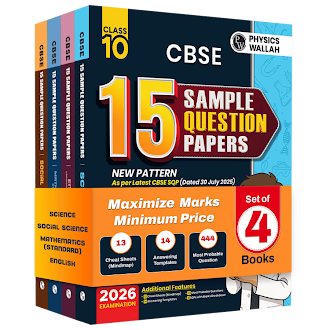CBSE Class 10 Science Chapter Wise Weightage

CBSE Class 10 Science Chapter Wise Weightage:- The Class 10 Science Weightage Chapter Wise Marks 2024 provides a detailed breakdown of marks distribution across various units and chapters, offering students a clear idea of how to prioritize their preparation. Topics such as Chemical Substances, Life Processes, Light, Electricity, and Environmental Management contribute specific marks, as outlined in the weightage of science class 10.
Understanding the weightage of science class 10 NCERT 2024 helps students focus on the most important areas and efficiently manage their revision time. The chapter-wise weightage for science-class 10 also includes marks for internal assessments, which play a crucial role in the final score. By reviewing the marks distribution of science class 10 and the marks weightage of science class 10, students can streamline their study plan and enhance their chances of scoring well.
Vishwas Diwas With PW: India's Biggest Education Festival Live from 28th Feb 2026
Marks Distribution of Science Class 10
Section A: Objective Type Questions (20 Marks)
This section contains 20 Multiple Choice Questions (MCQs), each worth 1 mark. The total weightage for this section is 20 marks. It will evaluate your understanding of key concepts from various units of the Science syllabus, testing your basic knowledge.
Section B: Short Answer Type Questions-I (12 Marks)
This section includes 6 questions, with each question carrying 2 marks. The overall weightage for this section is 12 marks. These questions focus on your ability to recall important facts, explain basic concepts, and solve straightforward problems from the syllabus.
Section C: Short Answer Type Questions-II (21 Marks)
Check out: CBSE Class 10th Books
This section contains 7 questions, each valued at 3 marks, giving a total weightage of 21 marks. The questions in this section are designed to assess your deeper understanding and ability to apply scientific principles in a more detailed manner.
Section D: Long Answer Type Questions (15 Marks)
This section includes 3 questions, with each question carrying 5 marks. The total weightage for this section is 15 marks. These questions will test your comprehensive understanding of the topics and your analytical abilities. Detailed explanations and examples will be required in your answers.
Section E: Source-Based/Case-Based Questions (12 Marks)
This section consists of 3 questions, each worth 4 marks. The total weightage for this section is 12 marks. The questions are aimed at evaluating your ability to analyze and interpret data, as well as apply scientific knowledge to real-life scenarios and case studies.
Check out: CBSE Class 10th Sample Papers
CBSE Class 10 Science Chapter-Wise Weightage 2024
As you must be speeding up the preparation for the CBSE Class 10 Science 2024 exam, understanding the chapter-wise weightage is key to effective preparation. The marks distribution of Science Class 10 helps you identify which topics carry more weight, allowing you to prioritize your study sessions. Below is the weightage of Science Class 10 chapter-wise along with an overview of how to approach your revision:
Unit 1: Chemical Substances – Nature and Behaviour
The weightage of Science Class 10 for this unit is significant, as it covers essential concepts like chemical reactions, acids, bases, and salts. Understanding these topics is crucial for performing well in both theoretical and practical exams. This unit includes the study of chemical laws and properties of matter, making it an important chapter in the overall marks weightage of Science Class 10.
|
Chapter Name |
Weightage |
|
Chemical Reactions and Equations |
9 Marks |
|
Acids, Bases, and Salts |
5 Marks |
|
Metals and Non-Metals |
7 Marks |
|
Carbon and its Compounds |
5 Marks |
|
Periodic Classification of Elements |
1 Mark |
|
Total Weightage |
27 Marks |
Unit 2: World of Living
The World of Living unit focuses on biological processes such as reproduction, life cycles, and the human digestive and respiratory systems. Given the depth of topics covered in this unit, it holds a moderate weightage of Science Class 10. Be sure to study topics like human anatomy and health to secure good marks.
|
Chapter Name |
Weightage |
|
Life Processes |
8 Marks |
|
Control and Coordination |
3 Marks |
|
How Do Organisms Reproduce? |
5 Marks |
|
Heredity and Evolution |
7 Marks |
|
Total Weightage |
23 Marks |
Unit 3: Natural Phenomena
In this unit, you explore natural phenomena such as light, sound, and the laws of reflection and refraction. Weightage of Science Class 10 NCERT 2024 suggests that this unit is key for scoring well in the exam. It has a moderate weightage and requires a solid understanding of basic physics principles.
|
Chapter Name |
Weightage |
|
Light – Reflection and Refraction |
10 Marks |
|
The Human Eye and the Colourful World |
2 Marks |
|
Electricity |
7 Marks |
|
Total Weightage |
19 Marks |
Unit 4: Effects of Current
The Effects of Current unit involves concepts like electricity, electric circuits, Ohm’s law, and the impact of electric current in various devices. This unit carries a high weightage of Science Class 10 in both theoretical and practical exams. Mastering this section can significantly improve your exam performance.
|
Chapter Name |
Weightage |
|
Magnetic Effects of Electric Current |
5 Marks |
|
Sources of Energy |
1 Mark |
|
Total Weightage |
6 Marks |
Unit 5: Natural Resources
The study of Natural Resources and their conservation, including topics on pollution and the environment, is another important unit. This chapter has moderate weightage and is essential for understanding environmental science and sustainability. It contributes to a broader perspective in the marks distribution of Science Class 10.
|
Chapter Name |
Weightage |
|
Our Environment |
4 Marks |
|
Sustainable Management of Natural Resources |
1 Mark |
|
Total Weightage |
5 Marks |
Read More: CBSE Class 10 Science Sample Paper PDF with Downloaded Solutions
CBSE Class 10 Science 2024: Weightage for Internal Assessment
Besides the board exams, the internal assessment weightage plays a major role in your final score. The marking scheme of Science Class 10 includes periodic tests, practical exams, and project work. Therefore, don’t overlook internal assessments, as they contribute to your final grade.
For comprehensive preparation, refer to the sample paper Class 10 Science, which is an excellent tool for practising time management and understanding the types of questions likely to appear in the exam.
|
Internal Assessment Type |
Weightage |
|
Periodic Assessment |
5 Marks |
|
Multiple Assessment |
5 Marks |
|
Subject Enrichment Activity |
5 Marks |
|
Portfolio |
5 Marks |
CBSE Class 10 Science Sample Papers
CBSE Class 10 Science Sample Papers are a great way for students to practice and understand the exam pattern. Solving a sample paper class 10 science helps students get familiar with the types of questions and manage their time during the exam. By checking the marking scheme of science class 10, students can learn how marks are distributed across different sections, which helps in focusing on important topics.
Physics Wallah (PW) provides many helpful resources, including sample papers and detailed solutions, to support your studies. Using PW's study materials will help you practice effectively and improve your chances of performing well in the CBSE Class 10 Science exam.
Effective Preparation Tips for CBSE Class 10 Science
Effective preparation for the CBSE Class 10 Science exam requires a well-planned strategy and a clear understanding of the important topics and their marks distribution. Check out the Effective Preparation Tips for CBSE Class 10 Science below:-
1. Use Previous Year Question Papers (PYQs):
-
Solving CBSE Class 10 PYQs is one of the right ways to understand the exam pattern and the types of questions frequently asked.
-
This will help you get an idea of the marks distribution of science class 10 and also give you insights into the most important topics.
2. Practice with Question Banks:
-
A CBSE Class 10 question bank contains a wide range of practice questions based on the syllabus, including important topics with high weightage of science class 10.
-
Regularly solving these questions will improve your problem-solving skills and boost your confidence.
3. Focus on High-Weightage Topics:
-
Review the Class 10 Science weightage chapter-wise marks 2024 to identify key chapters and allocate more time for them.
-
Prioritise chapters like Chemical Substances, Life Processes, and Electricity, which have a higher weightage of science class 10 NCERT 2024.
4. Solve Sample Papers:
-
Solve sample paper class 10 science to get a feel of the real exam. This will help you understand the question format and improve your time management during the exam.
5. Understand the Marking Scheme:
-
Study the marking scheme of science class 10 to know how each type of question is evaluated.
-
Focus on answering questions in the expected format and structure to earn maximum marks.
6. Regular Revision:
-
Consistent revision is key to retaining concepts. Use question banks and PYQs for quick revision of all topics, especially those with lower weightage.
CBSE Class 10 Books for All Subjects
|
- |
CBSE Class 10 Science Chapter Wise Weightage FAQs
1. What is the weightage of each chapter in Class 10 Science?
-
The weightage of each chapter varies. Chapters like Chemical Substances, Life Processes, and Electricity typically carry more marks compared to others. You can find the specific chapter-wise weightage in the official Class 10 Science syllabus.
2. How can I find the chapter-wise weightage for Class 10 Science 2024?
-
The Class 10 Science weightage chapter-wise marks 2024 is available in the official syllabus and can also be found in resources like sample papers and question banks by PW.
3. Why is it important to know the weightage of each chapter?
-
Knowing the weightage of science class 10 helps you prioritize your preparation. Focusing on high-weightage chapters ensures better chances of scoring well in the exam.
4. How does the weightage of Science Class 10 impact my exam preparation?
-
Understanding the marks distribution of science class 10 allows you to allocate time efficiently. You can focus more on chapters with higher weightage and still give adequate time to others.
5. How can I use the weightage to plan my study schedule?
-
Based on the weightage of science class 10 NCERT 2024, plan to cover the chapters with higher marks first. This helps you build a strong foundation in important topics before moving to less important ones.













